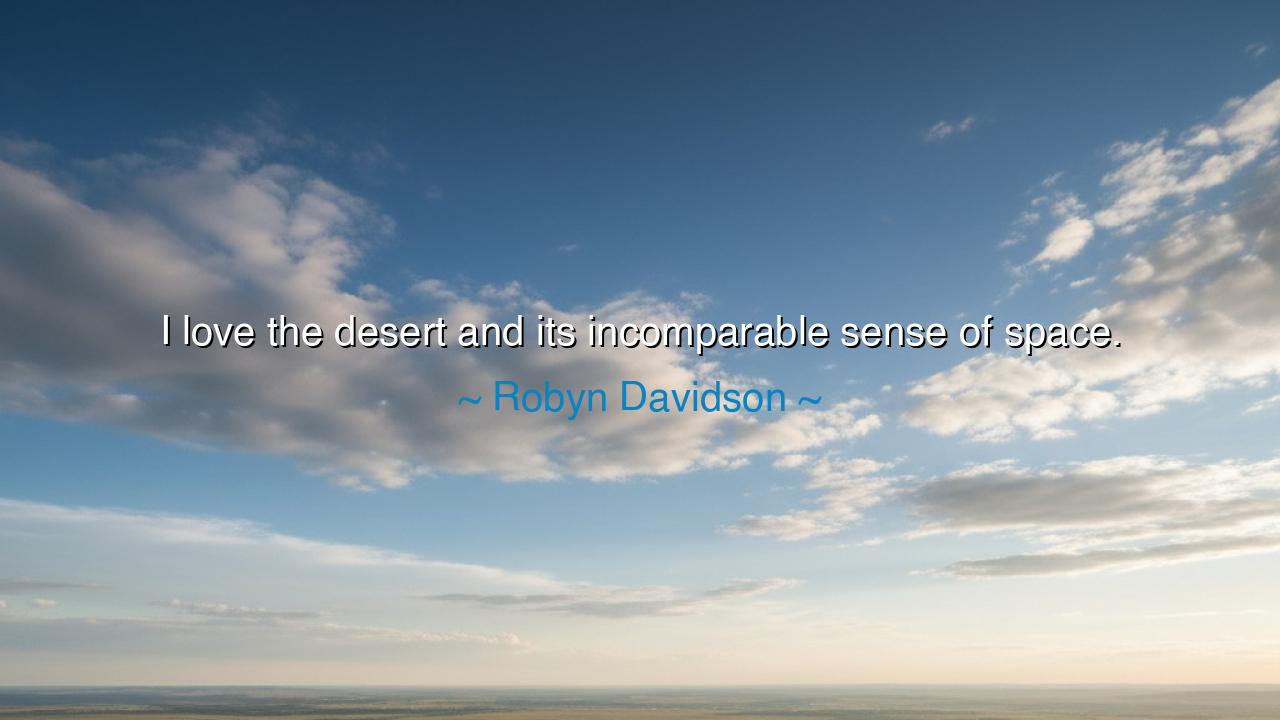
I love the desert and its incomparable sense of space.






Hear the words of Robyn Davidson, wanderer of sands and seeker of silence, who declared: “I love the desert and its incomparable sense of space.” At first, the saying seems simple, the quiet murmur of a traveler’s affection. Yet beneath it lies an eternal truth, for the desert is not only a place of dust and stone—it is a realm of testing, of vision, of the soul laid bare. And the space she speaks of is not only the distance of horizon to horizon, but the boundless expanse of spirit awakened when man or woman stands alone before the infinite.
The origin of this thought comes from Davidson’s own great journey across the Australian desert, when she traveled two thousand miles with only her camels and her dog for company. In that vast emptiness, stripped of the noise and clutter of civilization, she discovered something few dare to seek: the freedom of solitude, the fierce beauty of silence, and the space where the soul can expand without walls. The desert, in its merciless purity, gave her not only hardship, but clarity.
The ancients, too, knew the power of the desert. Prophets and hermits fled into the wilderness to wrestle with themselves and their gods. Moses wandered forty years in its vastness, forging a people’s identity beneath the endless sky. The Desert Fathers of early Christianity sought in its barrenness a greater fullness of spirit, for they knew that the absence of comfort creates the presence of truth. The space of the desert is incomparable, for it strips away illusion until only the essential remains.
Consider also the story of T. E. Lawrence, known as Lawrence of Arabia, who crossed the Arabian sands during the Great War. He spoke of the desert as both torment and teacher, a place where men were tested by heat, thirst, and emptiness, yet where they found strength and vision beyond the reach of ordinary life. The desert demanded endurance but gave in return the gift of clarity, for in its space, a man learns how small he is—and how vast his soul may become.
The meaning of Davidson’s words is both tender and heroic. To love the desert is to love not abundance, but absence; not noise, but silence; not walls, but the open sky. It is to cherish the rare gift of space, which the crowded world has nearly forgotten. In that space, one discovers freedom from the weight of possessions, from the tyranny of schedules, from the endless clamor of voices. The desert reminds us that to be fully alive, one must sometimes be fully alone.
The lesson is clear: seek your own desert, whether in the sands of the earth or in the silences of the heart. Do not fear emptiness, for it is in emptiness that you will find fullness. Create space in your life—space to breathe, to reflect, to listen to the still voice within. The desert teaches that the soul expands when the world contracts, and that wisdom comes not always in abundance, but often in scarcity.
Practical actions flow from this wisdom. Step away from the clamor of daily life; walk into nature, even if only for a day, and taste solitude. Simplify your surroundings so that your spirit may find space to move. Do not flee from silence, but embrace it, and let it teach you. And when hardship comes, remember the desert’s gift: that through endurance of the barren, one may discover the infinite.
Thus, Robyn Davidson’s words are not merely those of a traveler, but of a prophetess of the wilderness: “I love the desert and its incomparable sense of space.” Let us remember her teaching: that beyond the walls of noise and abundance lies a freedom we all crave—the freedom of vastness, of silence, of belonging to nothing but the earth and the sky. And those who dare to walk the desert path will find not emptiness, but eternity.






AAdministratorAdministrator
Welcome, honored guests. Please leave a comment, we will respond soon